Reduced Change

What are the impacts of global warming on agricultural production and food supply ?
This article discusses the impacts of global warming on agricultural production and food supply, including changes in climate patterns, reduced crop yields, loss of biodiversity, decreased nutrient content, heat stress in livestock, changes in feed availability, increased risk of disease, reduced food availability, increased food prices, and food safety concerns.
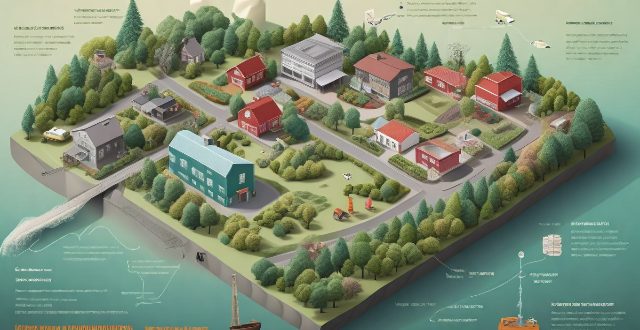
What is the impact of climate change on the global economy ?
Climate change affects the global economy in various ways, including reduced crop yields, water scarcity, forest fires, changes in energy production, human health issues, displacement and migration, and insurance and financial risks. Addressing climate change is crucial for both environmental and economic reasons.
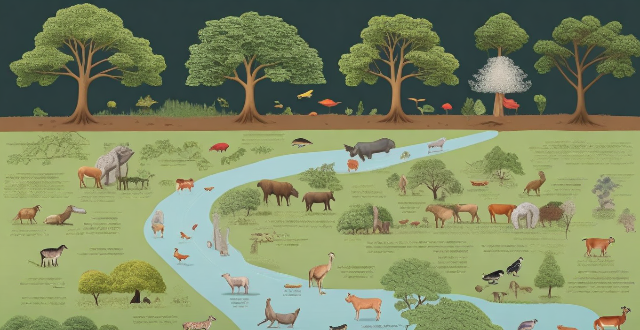
What are the potential consequences of climate change for forest-dependent communities ?
The article discusses the potential consequences of climate change for forest-dependent communities, including loss of habitat and alteration of ecosystems leading to reduced access to resources, changes in precipitation patterns affecting water availability, and impacts on agriculture and food security due to changes in crop yields and increased pests and diseases. Addressing these challenges requires a comprehensive approach that involves both adaptation strategies and efforts to mitigate the effects of climate change.

In what ways does climate change exacerbate existing food insecurity issues ?
Climate change exacerbates food insecurity by causing unpredictable weather, altering crop yields, increasing pest and disease outbreaks, contributing to biodiversity loss, and impacting fisheries. Addressing these challenges requires a comprehensive approach that includes adaptation strategies, sustainable agriculture practices, and efforts to mitigate the effects of climate change.

How does climate change influence nutrition and dietary health through changes in food production ?
Climate change affects nutrition and dietary health by altering food production, impacting crop yields, nutrient content, pest and disease pressure, and the availability and accessibility of food. Sustainable agricultural practices and adaptation are crucial for mitigating these effects and ensuring global food security.
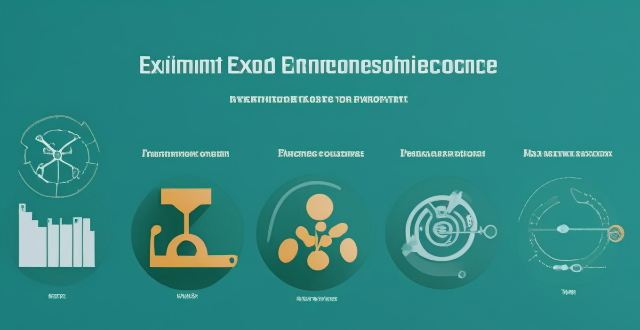
What is the relationship between climate change and poverty ?
This article examines the complex relationship between climate change and poverty, explaining how each exacerbates the other. It outlines the impact of climate change on poverty through increased natural disasters, loss of livelihoods, and health risks. Conversely, it also explores how poverty contributes to climate change through deforestation, energy poverty, and lack of resources for climate action. The article concludes by emphasizing the need for urgent attention from policymakers and individuals to address both issues simultaneously, aiming for a more equitable and sustainable future.

How does climate change impact water resource management ?
Climate change significantly impacts water resource management by altering precipitation patterns, increasing evaporation rates, and changing runoff patterns. These changes lead to more variable rainfall, prolonged droughts or intense flooding, reduced snowpack, and earlier spring runoff, among other effects. To adapt, strategies such as water conservation, infrastructure upgrades, integrated planning, ecosystem restoration, and improved monitoring and forecasting are essential for ensuring sustainable water resources amidst a changing climate.
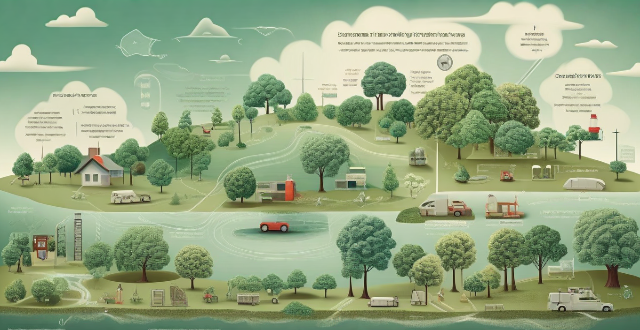
How do climate change and biodiversity loss intersect ?
Climate change and biodiversity loss are interconnected issues that impact each other significantly. Climate change can lead to habitat loss, altered migration patterns, and changes in prey-predator relationships, all of which can result in reduced populations or even extinction for some species. On the other hand, biodiversity loss can reduce carbon sequestration, compromise soil health and water regulation, and impair ecosystem services that help mitigate climate change. Urgent action is needed from all stakeholders to address these challenges and protect our planet's fragile ecosystems.
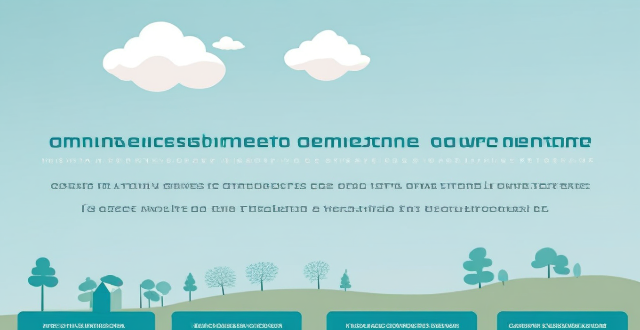
What are the potential consequences of ignoring climate change ?
The text discusses the potential consequences of ignoring climate change, including environmental effects such as extreme weather events and loss of biodiversity, economic disruptions like damage to agriculture and infrastructure, public health issues including the spread of diseases and heat-related illnesses, and social impacts such as forced migration and reduced quality of life. It emphasizes the importance of addressing climate change to avoid these catastrophic implications for our planet and all life on it.

What are the economic consequences of climate change ?
The article discusses the economic consequences of climate change, including its impact on agriculture, tourism, energy, and infrastructure. In agriculture, decreased crop yields, loss of biodiversity, and increased extreme weather events can lead to higher food prices and reduced agricultural income for farmers. In tourism, loss of natural attractions, changes in seasonality, and health risks can result in reduced tourism revenue for affected regions. In energy, increased demand for cooling systems, disruption of energy production facilities, and transition to renewable energy sources can create new economic opportunities but also require significant investment and adaptation. In infrastructure, damage to critical infrastructure like roads, bridges, and buildings can result in costly repairs and replacements for governments and private sector organizations. Addressing these challenges requires coordinated action by governments, businesses, and individuals to reduce greenhouse gas emissions and adapt to the changing climate.

How does climate change influence job security in coastal regions ?
Climate change significantly impacts job security in coastal regions through direct effects such as sea level rise, increased storm intensity, and changes in ocean temperatures. These environmental changes directly affect industries like fishing, tourism, agriculture, and infrastructure, leading to job losses or reduced hours for employees. Indirectly, climate change can cause economic displacement, public health concerns, and policy changes that create new job opportunities while potentially reducing jobs in other sectors. Addressing these challenges requires coordinated efforts from various stakeholders to adapt to changing conditions and transition towards more resilient economic systems.
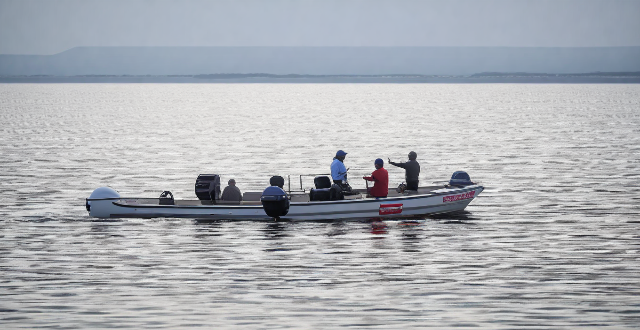
How does climate change affect the fishing industry ?
Climate change affects the fishing industry through changes in water temperature, ocean acidification, extreme weather events, changes in fisheries management policies, and economic impacts. These factors can lead to overfishing, reduced fish populations, damage to infrastructure and equipment, disruption of natural habitats, and decreased profitability for fishermen. To address these challenges, sustainable management practices and international cooperation are necessary to ensure the long-term viability of the fishing industry.
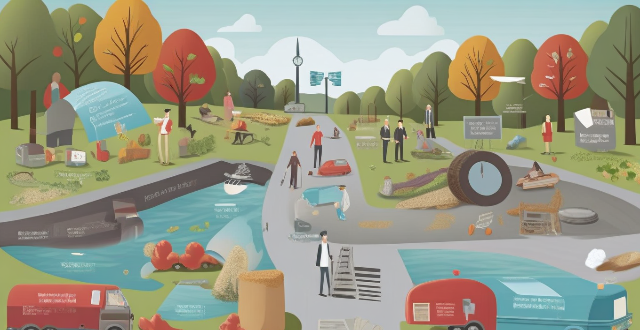
What are the implications of climate change negotiations for future generations ?
The implications of climate change negotiations for future generations are significant and multifaceted, affecting various aspects of life, including the environment, economy, society, and politics. Effective negotiations can lead to preserved natural ecosystems, mitigation of extreme weather events, job creation in renewable energy sector, reduction in energy costs, improved public health, enhanced quality of life, global cooperation, and leadership and innovation. These benefits highlight the importance of prioritizing the interests of future generations in climate change negotiations to ensure a sustainable and equitable world for all.

How does climate change affect forest ecosystems ?
Climate change affects forest ecosystems in numerous ways, including changes in temperature and precipitation, shifts in tree species distribution, alterations in fire regimes, increased pest and disease outbreaks, and reduced carbon sequestration. These impacts can lead to heat stress for trees, altered seasonal events, changes in tree growth rates, increased wildfire risk, and even tree mortality during extreme droughts. Invasive species may also outcompete native trees, further altering the structure and function of forest ecosystems. Addressing these challenges will require a multifaceted approach that includes reducing greenhouse gas emissions, protecting and restoring forests, and adapting to changing conditions.
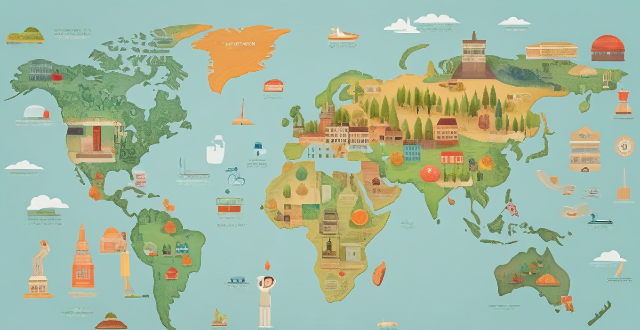
What are some examples of how climate change has exacerbated poverty in certain regions ?
Climate change significantly exacerbates poverty in various regions worldwide. It affects livelihoods, food security, health, displacement, and economic stability, disproportionately impacting impoverished communities. Addressing climate change is crucial for alleviating poverty.
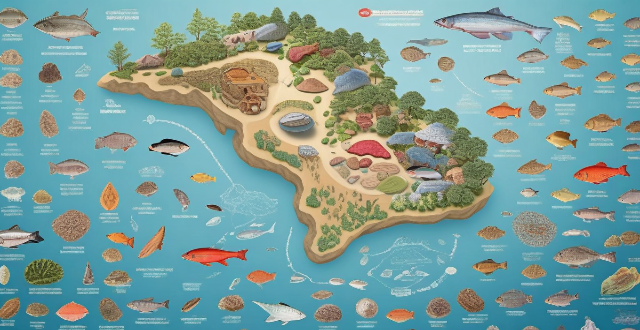
How does climate change affect biodiversity ?
This article explores how climate change affects biodiversity by altering ecosystems, species distribution, and genetic diversity. It discusses the impact of rising temperatures on habitat loss and altered precipitation patterns, ocean acidification on coral reefs and phytoplankton communities, and extreme weather events on fires and storms. The article also highlights the loss of genetic diversity due to reduced resilience and functional homogeneity in ecosystems, as well as inbreeding depression and genetic bottlenecks in species. Addressing climate change is essential for conserving biodiversity and maintaining healthy ecosystems.
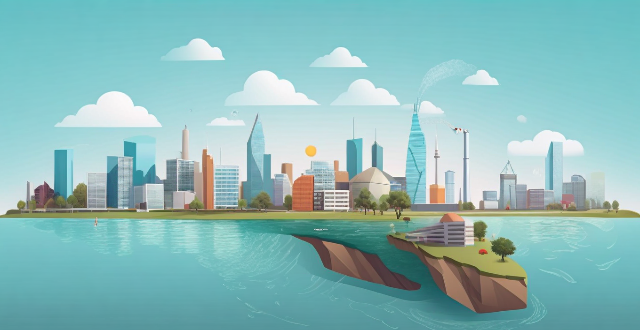
How do urbanization and land use change affect ecosystem services ?
The text discusses the impact of urbanization and land use change on ecosystem services, including provisioning, regulating, cultural, and supporting services. It highlights how these changes can lead to decreased water supply, reduced food production, negative effects on climate regulation and flood control, loss of recreational opportunities and cultural values, and disruption of soil formation and nutrient cycling. Mitigation strategies such as green infrastructure, sustainable urban planning, and land stewardship are suggested to minimize these negative impacts and maintain essential ecological functions.

What are the long-term implications of climate change for global food trade and market stability ?
Climate change is expected to impact global food production, trade, and market stability significantly. Reduced crop yields, unpredictable harvests, decreased livestock productivity, increased disease prevalence, shifting production zones, and increased competition for resources are some of the long-term implications. These changes can lead to price volatility, increased vulnerability to food insecurity, and economic challenges for farmers and consumers. Addressing these challenges requires a collaborative effort from governments, international organizations, and stakeholders across the food system to develop strategies that promote resilience and adaptive capacity in the face of climate change.

What is the impact of climate change on agricultural employment ?
Impact of Climate Change on Agricultural Employment: - Reduced Crop Yields due to droughts, floods, and loss of biodiversity can lead to job losses. - Changes in Cropping Patterns, such as shifting to new crops or shortened planting seasons, may require different skillsets and reduce employment opportunities. - Increased Pest and Disease Pressure can result in more labor for monitoring and management but also potential job losses from crop failures. - Infrastructure Damage and Displacement caused by extreme weather events can affect farming operations and employment levels. - Adaptation and Resilience Efforts, including developing resilient crop varieties and adopting sustainable farming practices, can create new job opportunities.
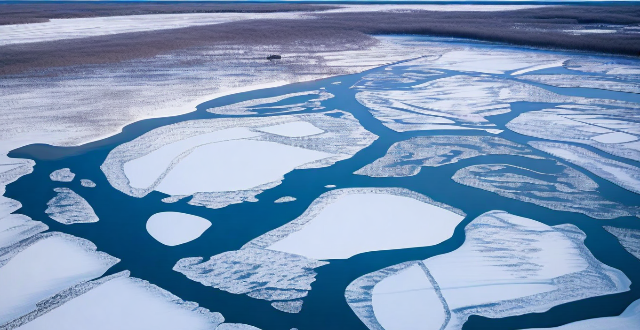
How is climate change affecting global water resources ?
The impacts of climate change on global water resources include reduced availability due to melting snowpack and glaciers, more frequent droughts and floods, saltwater intrusion into coastal aquifers, and changes in runoff patterns. Water quality is also affected by warmer water temperatures leading to harmful algal blooms, acid rain from increased carbon dioxide levels, pollutant transport from heavy rainfall events, and eutrophication from nutrient loading. The distribution of water resources is impacted by increased water stress in arid regions, migration and displacement of people seeking reliable water sources, strain on infrastructure from extreme weather events, and disruption of aquatic ecosystems due to altered flow regimes. Addressing these challenges requires both mitigation efforts to reduce greenhouse gas emissions and adaptation measures to build resilience against the impacts of climate change on water resources.

What are the gender-specific impacts of climate change on agriculture and food security ?
Climate change has gender-specific impacts on agriculture and food security. Women often bear the brunt of these impacts due to their roles in household food production and preparation, income generation through small-scale farming, and community leadership in natural resource management. Men, on the other hand, may experience changes in employment patterns, loss of income, increased stress, and social conflicts over resources. Both women and men face challenges such as reduced crop yields, increased workload, loss of traditional knowledge, health risks, and reduced dietary diversity. Addressing these gender-specific impacts requires a comprehensive approach that promotes gender equality and empowers both women and men to adapt to climate change.

What are the consequences of climate change for wildlife and ecosystems ?
Climate change has significant consequences for wildlife and ecosystems, including habitat loss, changes in species distribution, impacts on biodiversity, altered ecological processes, invasive species spread, pest outbreaks, and human health risks. It is crucial to take action to mitigate these impacts by reducing greenhouse gas emissions and implementing conservation measures.

Can using climate-friendly products really make a difference in combating climate change ?
Can Using Climate-Friendly Products Really Make a Difference in Combating Climate Change? Understanding Climate-Friendly Products: Clarification of what constitutes climate-friendly products, which are designed to have a lower environmental impact than their conventional counterparts. Individual Actions and Collective Impact: Small Changes, Big Results: The cumulative effect of individual actions can lead to significant environmental benefits, such as reduced carbon emissions and lowered resource depletion. Market Influence: Consumer choices drive market demand for eco-friendly products, encouraging businesses to adopt sustainable practices. Limitations and Considerations: Scale of Impact: Personal choices are essential but must be part of a broader strategy for addressing climate change effectively. False Sense of Accomplishment: Risk of individuals feeling they have done enough by using a few eco-friendly products. Cost and Accessibility: Potential barriers to adoption due to higher costs or limited availability. Conclusion: Using climate-friendly products can make a difference in combating climate change, but it is one piece of a larger puzzle that requires widespread adoption, innovation, and systemic change.

Is there a connection between multitasking and reduced attention span ?
The article discusses the potential negative impact of multitasking on attention span and suggests strategies to improve focus and productivity. The main points are: 1. Multitasking can lead to divided attention, overloaded cognitive resources, and habituation to short-term stimuli, all of which can reduce attention span. 2. To improve attention span, it is recommended to prioritize tasks, take breaks, and minimize distractions. 3. By implementing these strategies, individuals can enhance their ability to focus and maintain attention on important tasks.
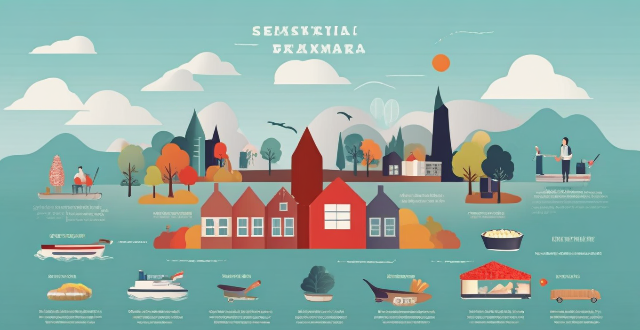
What is the relationship between climate change, food security, and national stability ?
The essay discusses the relationship between climate change, food security, and national stability. Climate change is causing extreme weather events that reduce crop yields and threaten biodiversity, leading to water scarcity. Food insecurity can result from these impacts, causing economic downturns, social unrest, migration, and political instability. Stable nations are better equipped to address these challenges through resource allocation, research, international cooperation, and emergency response.

How does climate change affect the performance of athletes in outdoor sports ?
Climate change significantly impacts outdoor sports by altering temperature, precipitation patterns, and air quality. Athletes face challenges such as dehydration, heat-related illnesses, muscle injuries from cold weather, event cancellations due to heavy rainfall, reduced efficiency in drought conditions, and respiratory problems from increased pollutants. Altered seasons disrupt training schedules and event scheduling. Strategies for adaptation include flexible scheduling, indoor alternatives, advanced performance wear, environmental simulation in training, health education, and readily available medical care during competitions.

What are the implications of climate change on the education and well-being of children worldwide ?
Climate change has significant impacts on the education and well-being of children worldwide. These impacts include disruption of education due to school closures and migration, health issues related to increased heatwaves and air quality problems, nutritional deficiencies from crop failures and food insecurity, psychological stress from natural disasters and anxiety about the future, loss of playgrounds and outdoor learning spaces, and socioeconomic impacts such as economic hardship and inequality in educational opportunities. Addressing these challenges requires a comprehensive approach that involves mitigating the effects of climate change and adapting educational systems to be more resilient.
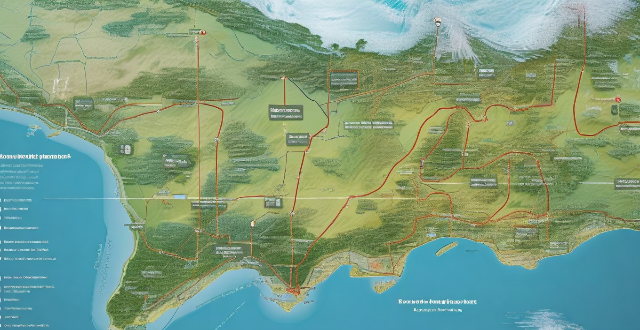
How does climate change affect the priorities in environmental monitoring ?
Climate change significantly impacts the priorities in environmental monitoring by necessitating a focus on rising sea levels, extreme weather events, changes in biodiversity, impacts on agriculture and food security, and air quality issues. Addressing these challenges requires a comprehensive approach that incorporates regular monitoring, early warning systems, adaptation strategies, and effective conservation planning.
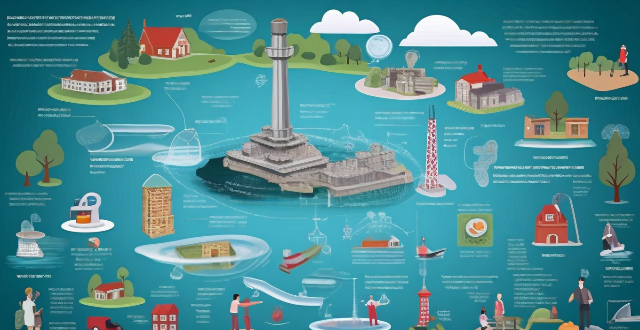
What are the ethical implications of climate change on human rights ?
Climate change affects the fundamental rights of individuals and communities worldwide through its impacts on health, food security, water access, and displacement. Rising temperatures and extreme weather events can lead to an increase in heat-related illnesses, respiratory problems, and infectious diseases, as well as exacerbate existing health disparities. Changes in temperature and precipitation patterns can disrupt agricultural production, leading to crop failures and reduced yields, resulting in food shortages, increased prices, and malnutrition. Climate change poses significant threats to water availability and quality, with rising temperatures leading to increased evaporation rates, droughts, and water scarcity. Displacement due to rising sea levels, flooding, and other environmental factors can result in loss of homes, livelihoods, and social networks, as well as increased vulnerability to violence and exploitation. It is imperative that governments, international organizations, and individuals take urgent action to mitigate the effects of climate change and protect the fundamental rights of all people, prioritizing the needs of vulnerable populations.

How does climate change affect biodiversity and ecosystems ?
Climate change, driven by human activities, significantly impacts biodiversity and ecosystems through various mechanisms such as temperature increase, changes in precipitation patterns, sea level rise, ocean acidification, extreme weather events, and altered species interactions. These effects can lead to extinction risk, habitat loss, food web disruption, and imbalances in ecosystem dynamics. Mitigating climate change and adapting to its consequences is crucial for preserving biodiversity and ecosystems.